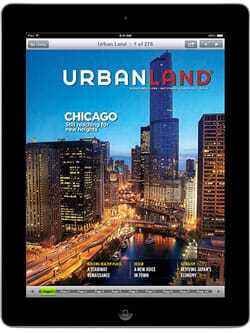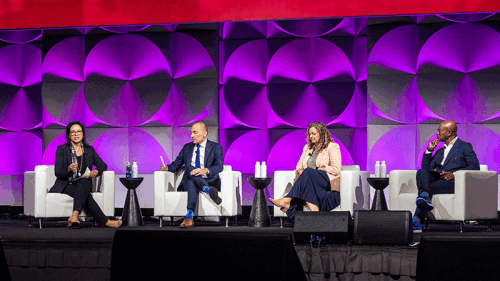We are particularly excited to present this issue of Urban Land. It is the first available to readers through an app on their iPad, iPhone, Android, or other mobile device—with the same layout, photography, and features offered in the printed version you hold in your hands. That print version of Urban Land is not going away. But many ULI members have told us they love their magazine, but wish they could take it along on their mobile device when they travel. The new app, which is available for free download in the app stores of Apple and Google, allows readers to enjoy the rich visual format of Urban Land and take advantage of mobile technology to share articles through e-mail and social media, zoom in on images for greater detail, and click through to web hyperlinks. Thank you to Brett Widness, who edits the online magazine ( urbanland.uli.org) and who shepherded this project.
The online magazine, by the way, remains the place to look for stories that break between issues of the print edition—and to enhance the conversation by adding your comments to articles. We would love to hear your reactions to the new mobile version of your magazine along with suggestions for ways we can refine the reading experience. Tell us, in particular, how you feel about the way Urban Land’s mobile version should be distributed. For this debut, the September/October issue will be available online to anyone who cares to search for it through the app stores. For the November/December issue, however, access will be restricted to ULI members. (We promise the authentication process will be quick and painless.) Let us know if you think the new app should remain a benefit of membership in ULI—or if you would rather have ULI spread the content as broadly as possible by opening access to anyone who is interested. Please send your thoughts to [email protected] or me at [email protected], and we will share them in an upcoming issue.
The cover of this issue draws attention to Chicago, host of the 2013 ULI Fall Meeting, November 5 to 8. The Trump International Hotel & Tower® (yes, the Trump organization has trademarked the name of its hotel) rises above the Chicago River in the heart of the Loop—representing old and new Chicago, side by side. The city’s dynamism is explored in several stories in this issue, and to help pull it all together, we have prepared a special “Site Visit” map that offers just a glimpse of what’s going on in and around the site of the Fall Meeting.
Among our Chicago stories are two that illustrate how the “City That Works” is embarking on ambitious plans to address two problems that trouble municipalities around the world: finding the money to fund critically needed infrastructure improvements, and rehabilitating homes that were lost and abandoned during the foreclosure crisis. In “Chicago’s Novel Infrastructure Trust,” beginning on page 87, Patrick J. Kiger writes about the city’s effort to raise $1.7 billion in private capital to rebuild the bridges and systems that make the city work on a daily basis. Starting on page 97, you will find a story about the new land bank being established in Cook County, which includes Chicago. As a longtime housing writer, I have interviewed many people who were caught up in the rash of foreclosures that swept Chicago and other cities following the housing bust. Some of their stories had recklessness at the heart of their problems; some clearly indicated abuse at the hands of second-mortgage sharpies; all of their stories were heartbreaking. Now cities have to deal with the physical scars left by the foreclosure crisis—abandoned homes, often stripped of their valuables like copper pipes, which drag down the value of entire neighborhoods. The land bank represents one way to rehabilitate those properties and help turn around such neighborhoods.
See you in Chicago.


